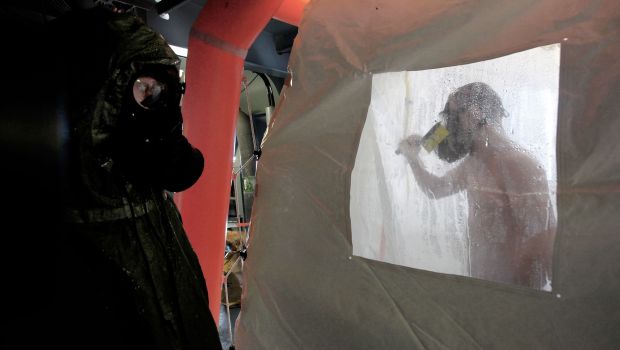
A crew member of the Danish warship Esbern Snare, which is transporting part of Syria’s chemical arsenal out of the country, enters a decontamination shower wearing a gas mask during drills at sea between Cyprus and Syria on Sunday, January 5, 2014. (AP Photo/Petros Karadjias)
London, Asharq Al-Awsat—The Syrian regime began moving chemical weapon precursor material out of the country on Tuesday after transporting it to the port city of Latakia and onto a waiting Danish vessel.
The Organization for the Prohibition of Chemical Weapons (OPCW) confirmed that “priority chemical materials” had been transported to Latakia and onto a Danish vessel which then sailed towards international waters.
The OPCW did not disclose how much of Syria’s chemical arsenal—totaling 1,300 tons—had been removed, merely confirming that nine containers of material had been sent aboard the Danish cargo vessel.
“The vessel has been accompanied by naval escorts provided by Denmark and Norway, as well as the Syrian Arab Republic,” an OPCW statement confirmed, adding, “It will remain at sea awaiting the arrival of additional priority chemical weapons at the port.”
Tuesday’s operation represents the first phase of an internationally backed disarmament agreement whose implementation had initially been given a December 31, 2013, deadline.
The Bashar Al-Assad regime’s implementation of the agreement comes as Syrian Information Minister Omran Al-Zoubi appeared to hint that the embattled president could seek re-election next July.
Speaking during a televised press conference on Tuesday, Zoubi said that while Assad had yet to take a decision on re-election—a major stumbling block in any negotiations between Damascus and the Syrian rebels—he claimed that there would be public support for any presidential bid.
“I can assure you that there is a popular Syrian decision to nominate President Bashar Al-Assad for the presidency of the republic,” he said.
“It is his personal decision . . . but I also assure you that the Syrian street will pressure President Assad to nominate himself for the presidency,” he added.
Zoubi also confirmed that Damascus will seek to put any agreement reached at the forthcoming Geneva conference—known as Geneva II—to public referendum.
The Assad government’s statements raise further questions about the conference, with the Western-backed Syrian National Coalition still undecided about attending the internationally backed peace talks scheduled for January 22.
Ahmed Jarba was re-elected as Syrian National Coalition president earlier this week, securing a six-month term and defeating a leadership challenge by former Syrian Prime Minister Riyad Hijab.
There has also been controversy regarding Iran’s position towards the peace talks, with Tehran not among the “first round” of nations invited to attend Geneva II.
Local Iranian media reported that Foreign Minister Mohamad Javad Zarif announced that Tehran would not accept any preconditions for participating in the peace talks, adding that they would also refuse to participate from the sidelines.
Washington in particular has objected to Iran’s participation at Geneva II over Tehran’s failure to publicly endorse the principles agreed at an earlier Geneva I peace conference which called for a transitional government in Syria.
US Secretary of State John Kerry said: “If Iran doesn’t support that, it’s difficult to see how they are going to be a ministerial partner in the process.”
For his part, Saudi Foreign Minister Prince Saud Al-Faisal called on the Syrian National Coalition to be recognized as the sole legitimate representative of the Syrian opposition, adding that the planned Geneva II talks should lead to the formation of a national government with broad powers that does not include Bashar Al-Assad.
Speaking during a visit to Pakistan, he said: “There are some parties who issue statements counter to the efforts to make Geneva II succeed in resolving the Syrian crisis.”
